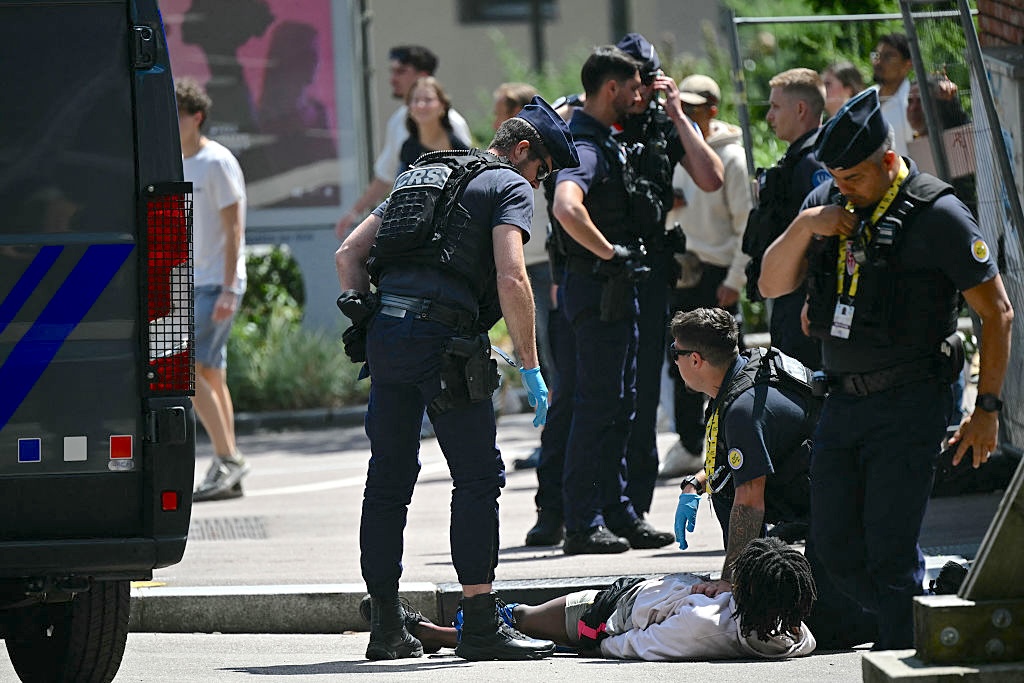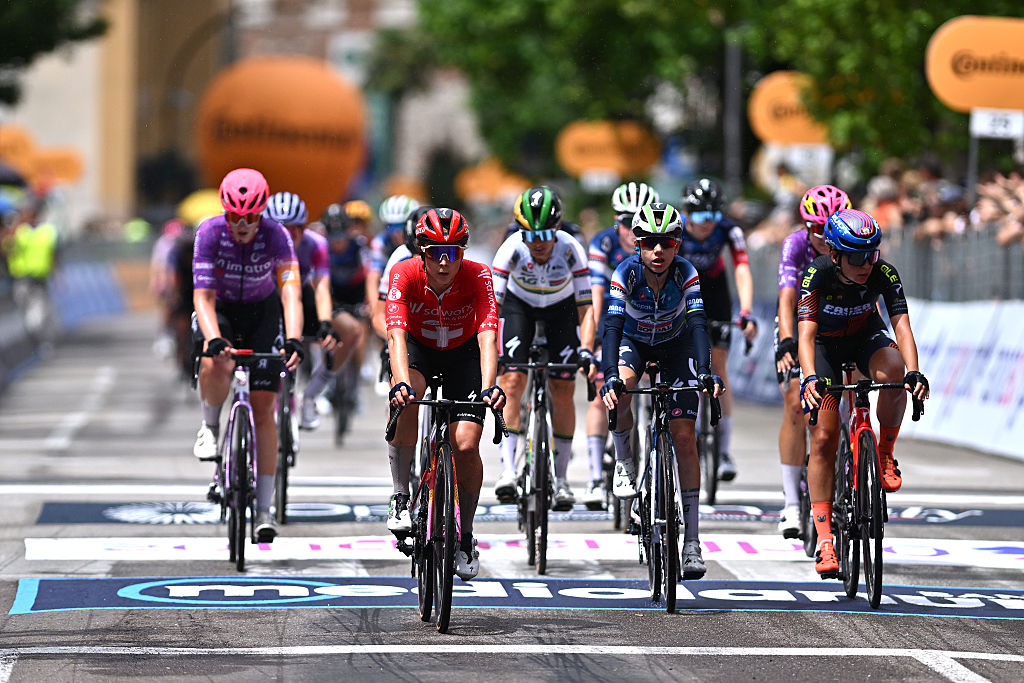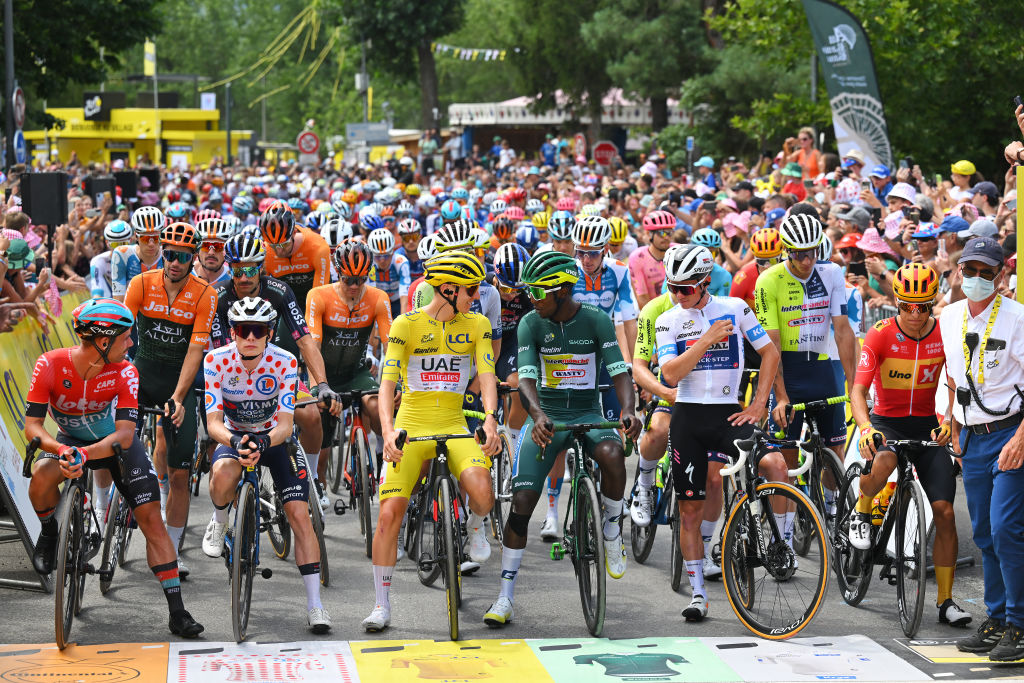Tour de France 2024 stage 14 preview: 'Too close to call' - leader Tadej Pogačar, Jonas Vingegaard face major Pyrenean mountain duel
July 13, 2024: Pau - Saint-Lary-Soulan Pla d'Adet, 151.9km
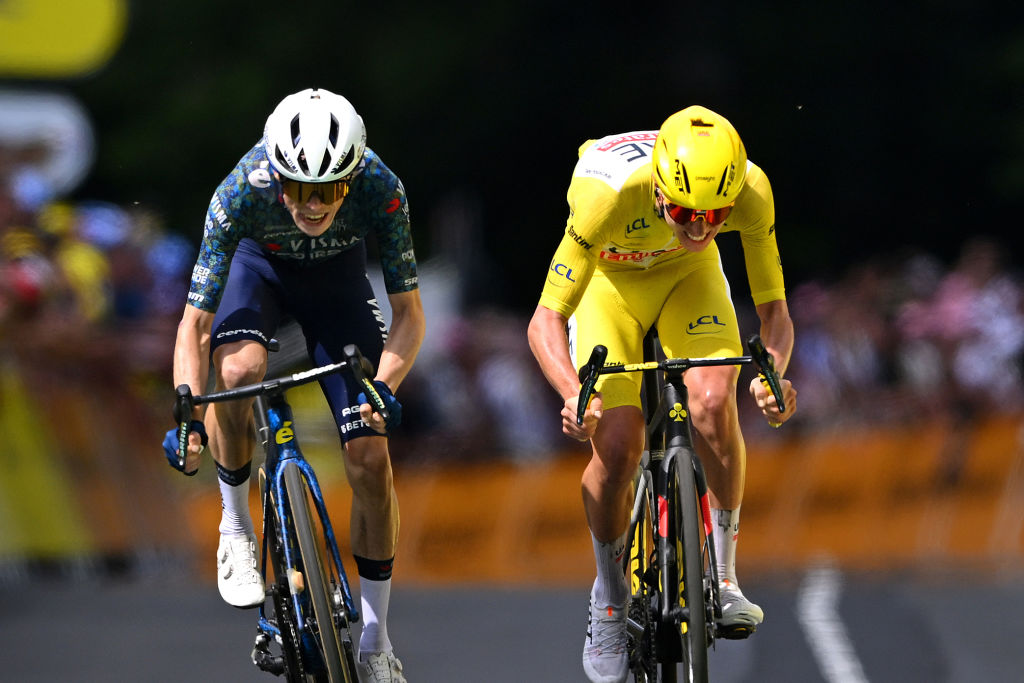
Will Tadej Pogačar retain his Tour de France yellow jersey on Pla d'Adet on Saturday? Or will defending champion Jonas Vingegaard, having defeated Pogačar in the Massif Central, now manage to wrest the yellow jersey back from his arch-rival on the first Tour de France summit finish of 2024?
These are just two of the questions that could be resolved on the 4,050 metres of vertical climbing crammed into just 151.9 kilometres of racing on stage 14 of the Tour de France on Saturday, including the toughest single ascent of the Pyrenees - the Col du Tourmalet - and the final HC ascent to Pla d'Adet.
But whatever else is decided, the heart of the Tour GC battle right now is the ongoing duel between the two strongest climbers to date of the 2024 race - both already with two Tour victories apiece in their respective palmares and now going head-to-head, for a fourth year in a row, in their fight for a third.
Much has been written about whether Vingegaard, having seen the Tour de France GC start to slip through his fingers in the first week, has now regained the upper hand after his stage 11 win in Le Lioran.
Pogačar, already dominating in the Alps albeit without landing a knockout blow and on the back foot vis-a-vis Vingegaard three days ago, will try to reverse the momentum once more and distance his arch-rival on the climbs. But perhaps the most accurate reading of the Tour so far is that neither rider has gotten the better of the other and that from the word go, both riders have clearly either been on their top game or very close to it.
"Looking at things without any inside information, I don't think Pogačar has got notably worse in these last two weeks or that Jonas is getting notably better," Ineos Grenadiers head coach Xabier Artetxe tells Cyclingnews. "I honestly don't think that between the two there's that much difference."
"It's not that Vingegaard has progressed enormously. Remember that on stage 2 Pogačar, one of the best riders in the world and in his best form right now was on a climb that suited him down to the ground - the San Luca, a mind-breakingly hard ascent.
"But Vingegaard could follow him on the San Luca: and that already tells you, right from the start of this race, that Vingegaard came to this Tour in a really good state of form."
"Then on the Galibier, sure, between bonus times and the descent and so on, Vingegaard lost around 40 seconds on the stage. But at the top of the Galibier, again a really tough climb and one where Pogačar was able to put so much time into riders like Roglič, Evenepoel and so on, Vingegaard was just nine seconds back.
"And if he's just nine seconds back on the Galibier, that means again that there isn't that much difference between the two. Certainly not as much as the GC" where Pogacar leads Vingegaard by 74 seconds - "would suggest."
Warming to his point, Artetxe argues that while Pogačar has been in the limelight because he has been attacking a lot and leading the race outright, Vingegaard has been partially eclipsed but racing intelligently and biding his time. Those roles were briefly but powerfully reversed at the end of stage 11 in Le Lioran, of course, where Vingegaard claimed the stage win ahead of Pogačar.
But as Artetxe sees it, the crunch moments where a more definitive verdict will emerge are almost all yet to come, and very little - beyond both riders being in great shape - can be read into what we have seen.
"Jonas knows that the third week is very important and we also know that Pogačar is probably the best rider in the world right now," Artetxe told Cyclingnews.
"But we can't forget that although Tadej won the Giro d'Italia very easily, he may well end up paying for that effort in the third week and we don't know how well he'll recover from that effort long-term., That's the big incognito."
"Right now that's the whole key to the psychological war between them: Tadej wants to get to the third week with as much time as possible on Jonas and Jonas wants to get to week 3 minimizing that advantage. So that that way he can look for a stage where he can open up a gap."
It's escaped nobody's notice, either, that where Vingegaard made the difference both in 2022 and 2023 was in the second half of the race. In 2022 his knock-out attack came on stage 11 on the Col de Granon and then in 2023, he devastated the field on the stage 16 time trial at Combloux and on the Col de la Loze the following day. Even in 2021, when he briefly dropped Pogačar on the upper slopes of the Ventoux, that was on stage 11, in the second half of the race.
However, as yet, neither rider has managed to put any significant distance into the other. And as Artetxe sees it, rather than a major underlying difference suddenly emerging in the Pyrenees or beyond that, in the Alps, the fate of the battle between the top two favourites for overall victory this year could end up turning on a dime - which then could create a much bigger, snowball, effect.
"For now the two are really on a similar level and I think it's the secondary factors that are going to have the biggest impact," Artetxe argues. "A day when it's really hot, say, or if one of them forgets to eat properly and cracks slightly. For now, any small mistake is, ultimately, what's going to drive a wedge between the two of them." And on Saturday, as on any mountain stage, the opportunities for those errors to appear will multiply - enormously.
Stage 14 profile
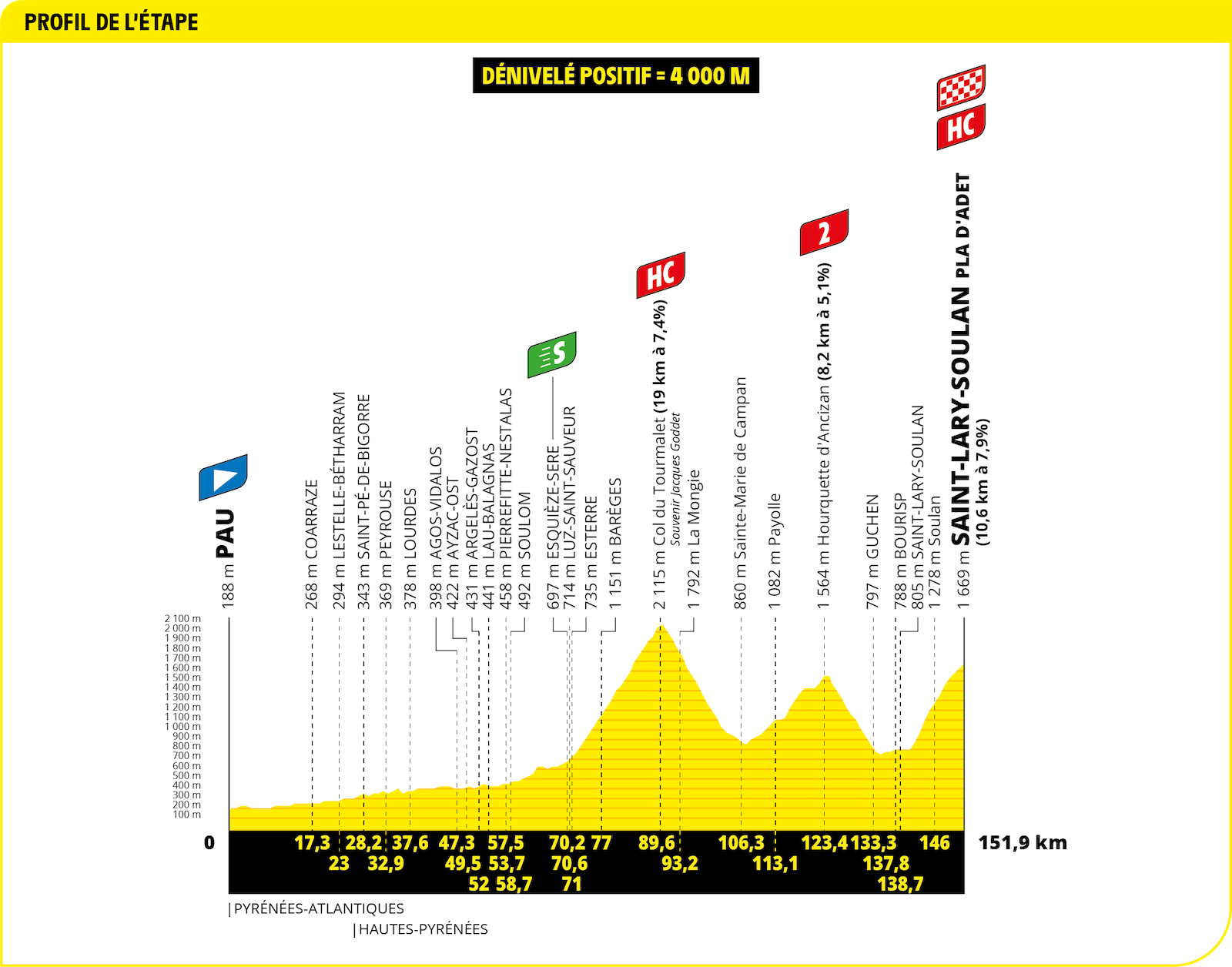
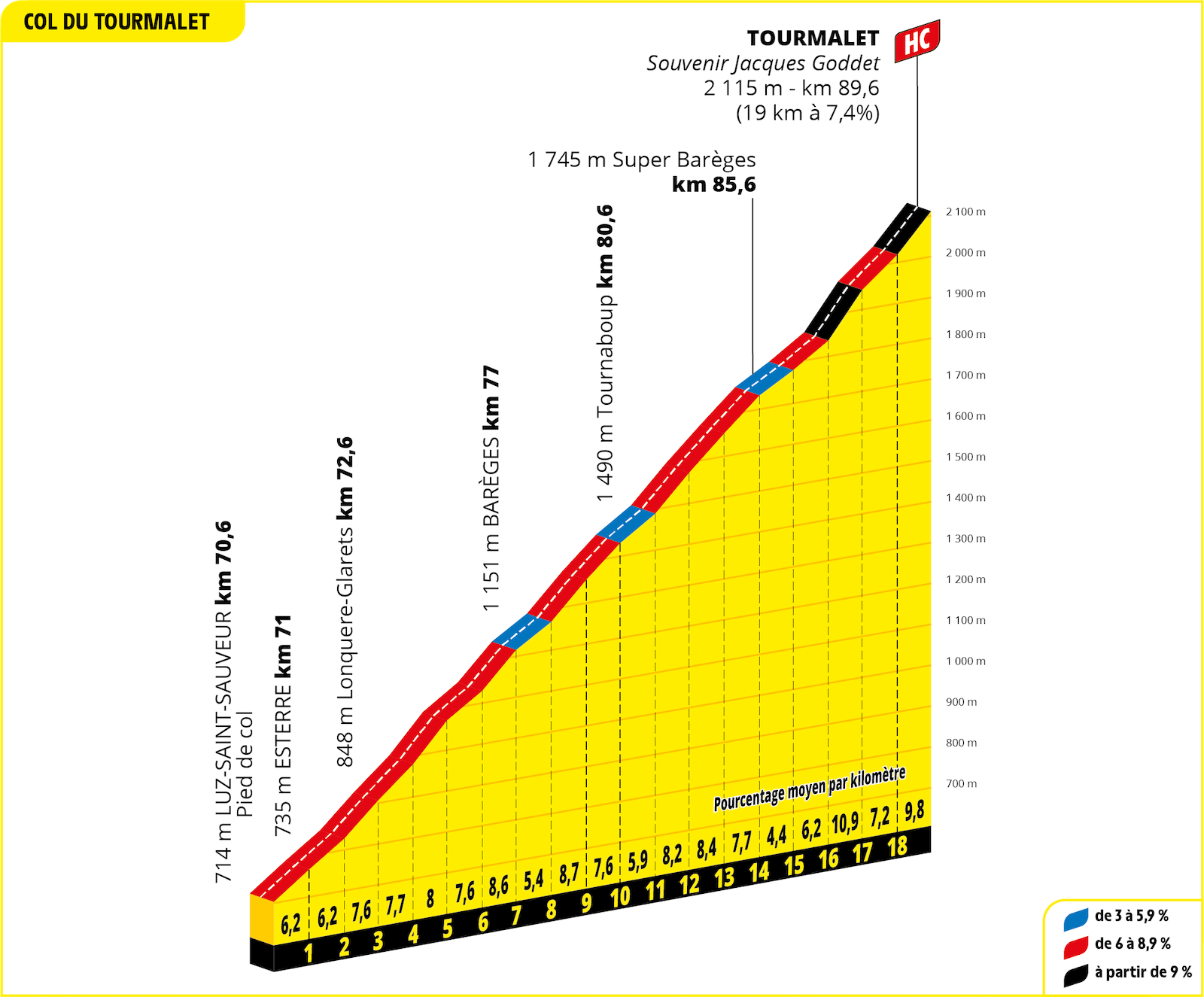
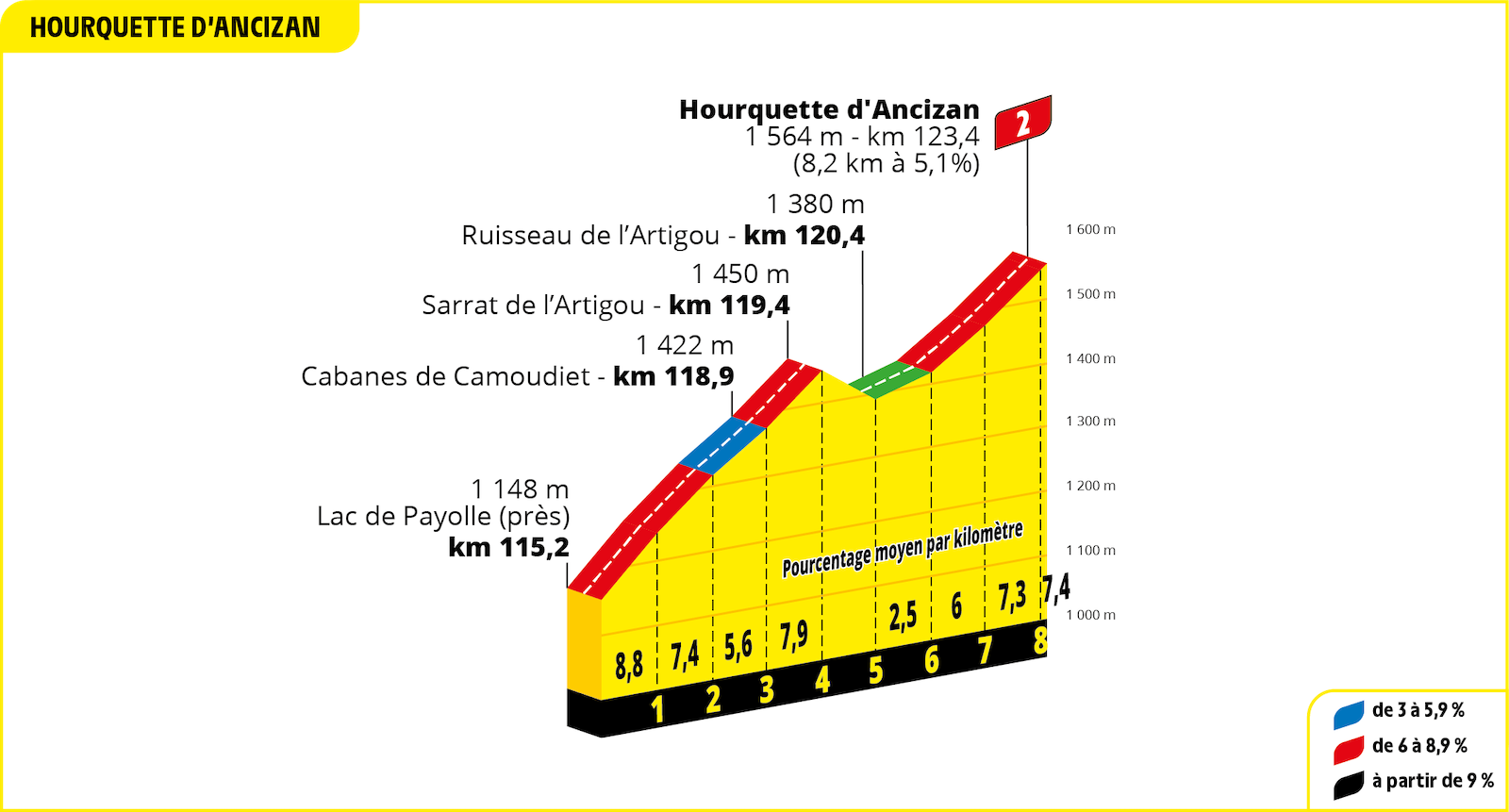
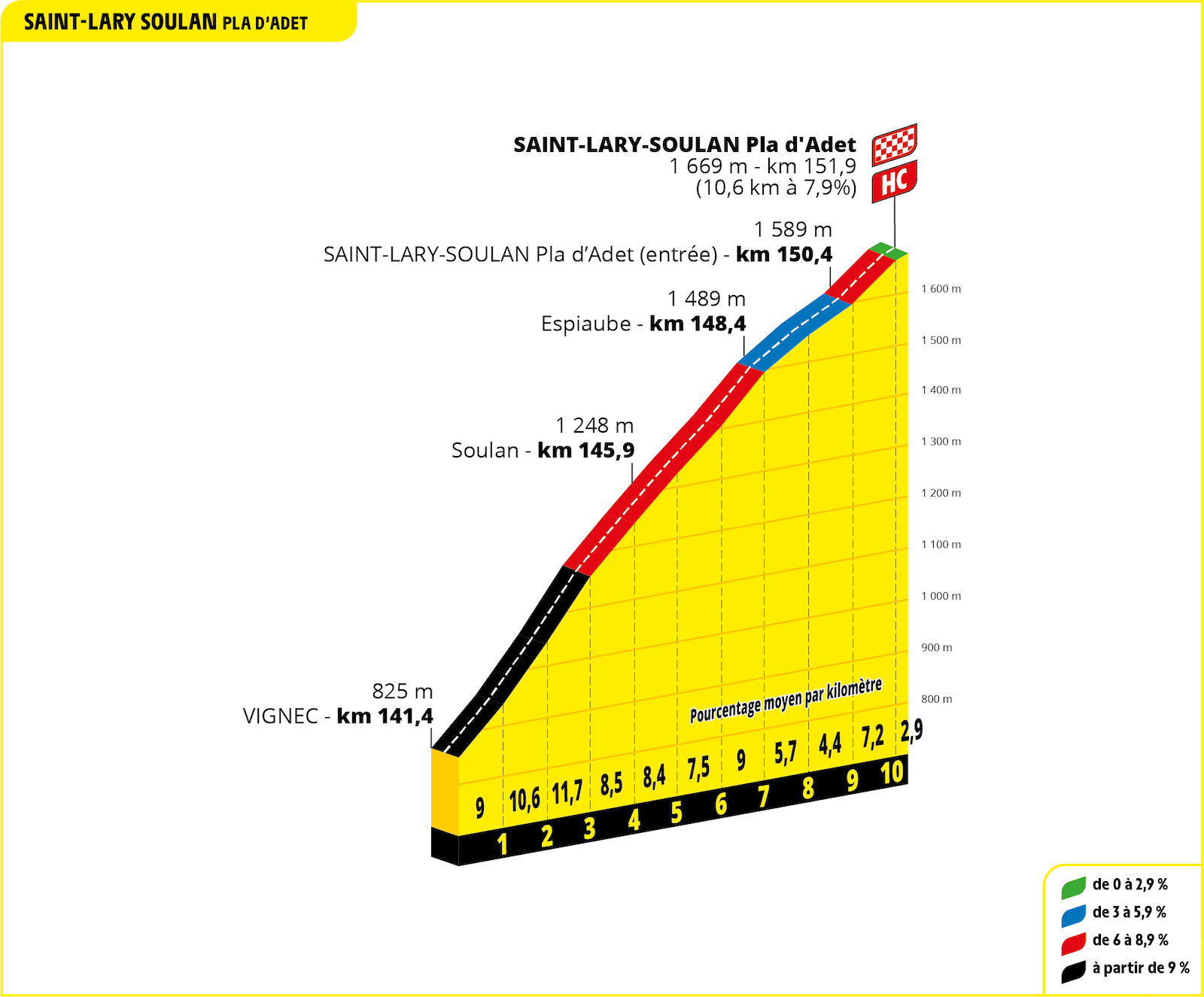
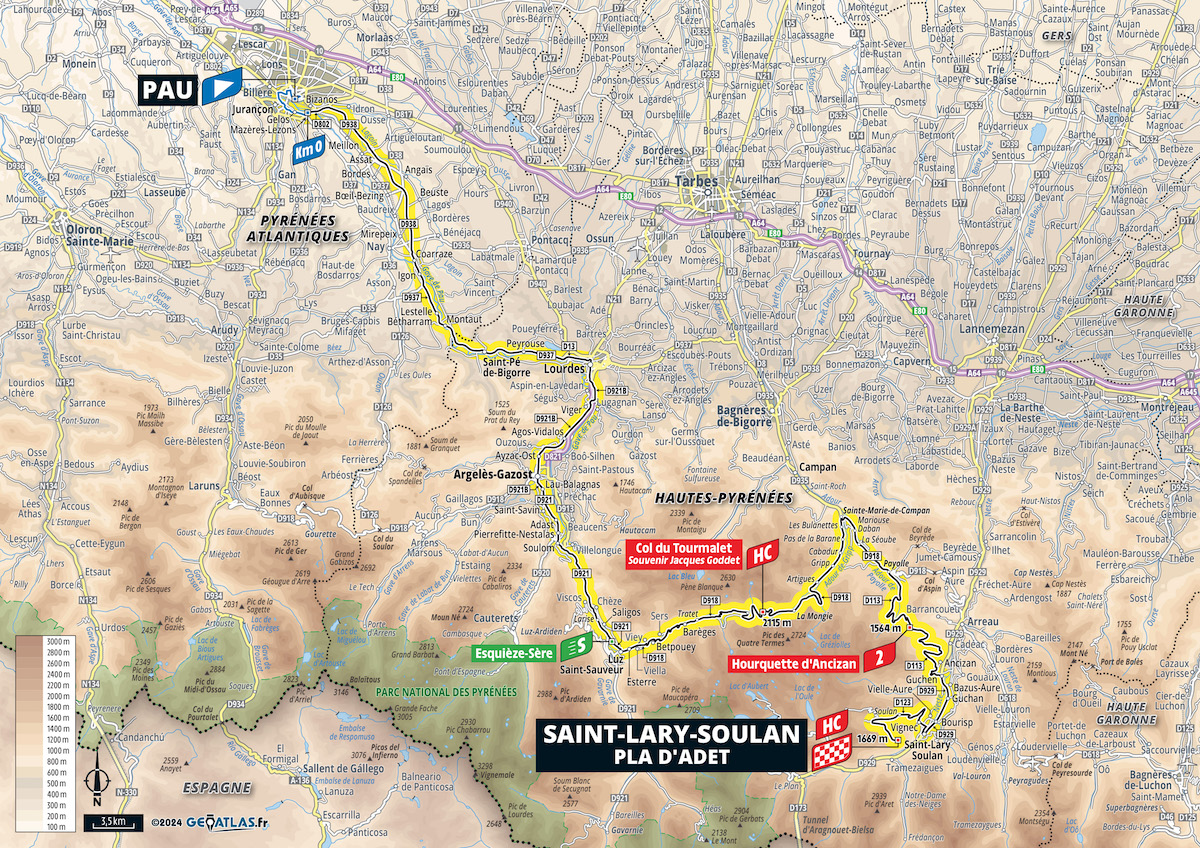
After two stages for the baroudeurs and sprinters, the climbers and general classification contenders will return to the forefront for stage 14, from Pau - Saint-Lary-Soulan Pla d’Adet with 4,000 metres of climbing over the 151.9km route.
The dynamic format of the first Pyrenean stage is accentuated by the fact that battle is unlikely to commence until the riders have gone through Lourdes, some 40 kilometres into the stage.
From that point, with 80 kilometres remaining, there will be a festival of climbing, starting with the Col du Tourmalet (19km at 7.4%) with the two steepest 9% ramps in the final three kilometres. Followed by the Hourquette d’Ancizan (8.2km at 5.1%) and ultimately the finish climb to Pla d’Adet (10.6km at 7.9%) where the steepest ramps occur in the first three kilometres.
Fifty years on, the finish line will be exactly where it was when Raymond Poulidor celebrated a solo victory in the 1974 Tour after dropping Eddy Merckx. It was Poulidor’s last win at the Tour.
Stage 14 Sprints
- Intermediate sprint, km 70.2
Stage 14 Mountains
- Col du Tourmalet - Souvenir Jacques Goddet (19km at 7.4%), cat. HC, km 89.6
- Hourquette d’Ancizan (8.2km at 5.1%) cat. 2, km 123.4
- Pla d’Adet (10.6km at 7.9%) cat. HC, km 151.9
The latest race content, interviews, features, reviews and expert buying guides, direct to your inbox!
Alasdair Fotheringham has been reporting on cycling since 1991. He has covered every Tour de France since 1992 bar one, as well as numerous other bike races of all shapes and sizes, ranging from the Olympic Games in 2008 to the now sadly defunct Subida a Urkiola hill climb in Spain. As well as working for Cyclingnews, he has also written for The Independent, The Guardian, ProCycling, The Express and Reuters.
Latest on Cyclingnews
-
French riot police shoot knife-wielding suspect before Tour de France finish stage 4 in Rouen
CRS police quickly neutralise the situation as huge crowds invade the stage finish area -
'I thought I saved it, but I didn't make it' - Race leader avoids injury in late crash in Giro d'Italia Women stage 3
Mass crash inside 3km but no lost time or major injuries in Giro peloton -
Amazon Prime Day 2025 Live: All the best deals as soon as we unearth them
We're trawling Amazon and beyond to bring you some absolute bargains -
How to watch the Tour de France 2025: TV, Streaming, official broadcasters
Where to watch the biggest race in the world this July

